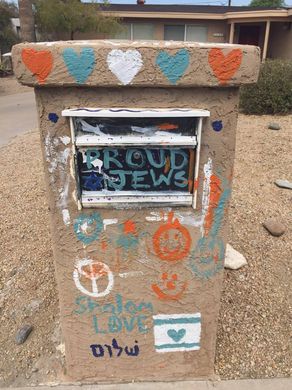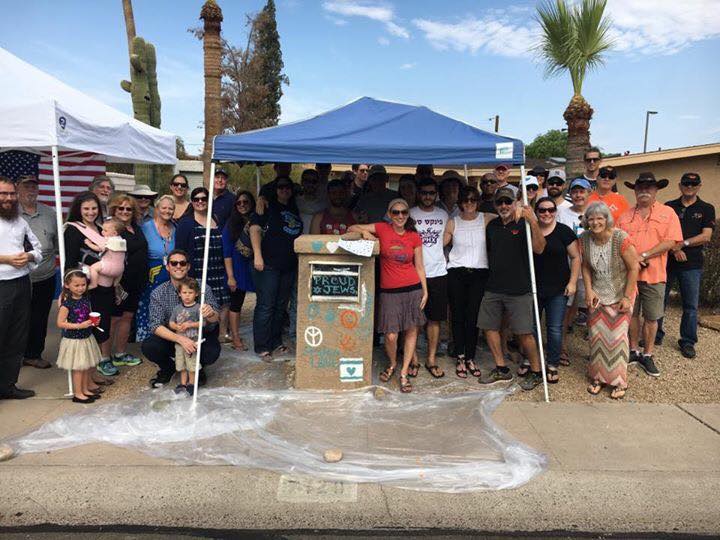A couple of weeks ago, my sister and her husband, Shoshana and Ari Simones, came home from vacation to find a swastika and “JEW” spray-painted on their mailbox and on the fence beside their home.
This is in Phoenix, Arizona. This is in 2017.
This is a symbol that represents a policy of extermination of Jews through mass murder. It’s not nice to discover that someone who knows where you live wants to see you killed.
“We’re not afraid, we’re not ashamed”
A first instinct is to want to make it disappear as quickly as possible. A kind neighbor covered it with paper, and after calling the police, even tried to get it cleaned up before my sister and her husband got home. Although it’s probably good that she didn’t.
With great bravery, strength, tact and intelligence, my sister and brother-in-law decided to leave up the graffiti and go public.
With help from the Arizona Anti-Defamation League, Shoshana and Ari began talking to the press — AZ Central, ABC 15, Fox 10, 12 News, and more — making sure that the coverage always noted this was not an isolated incident, but part of a spike in anti-Semitic acts in Phoenix this year. Eventually the story went national, reaching the USA Today. “We’re not afraid,” my sister said, again and again. “We’re not ashamed. We’re proud Jews.”
The response from the community, at every level, was a rebuke to those who would intimidate and threaten Jews or other minorities. From the very beginning, to their credit, the Phoenix Police Department took the incident seriously, referring it to their special bias crimes unit, and the FBI stepped in as well. And the mayor of Phoenix, Greg Stanton, gave Shoshana and Ari a call to express his support. At a more local level, neighbors sent flowers, came by to ask if there was anything they could do, sent notes of support. Strangers became friends.
“I definitely smile when I see it”
 Of course, my sister and brother-in-law weren’t going to leave up a symbol of hate forever. But rather than cover it up as if nothing had happened, they decided to throw a party, inviting the community to come and repaint their mailbox with messages of love and inclusion.
Of course, my sister and brother-in-law weren’t going to leave up a symbol of hate forever. But rather than cover it up as if nothing had happened, they decided to throw a party, inviting the community to come and repaint their mailbox with messages of love and inclusion.
From a symbol of hate, Shoshana and Ari brought the community together and created a symbol of joy. “I definitely smile when I see it,” my sister told AZ Central.
It’s notable that in the middle of all this, after Shoshana and Ari said they’d leave up the word “JEW” and write “PROUD” above it, someone — presumably the perpetrator — came in the middle of the night and covered over the graffiti with what appeared to be the same black spray paint that had been used in the first place.
It’s impossible to know why. Perhaps the perpetrator felt ashamed. Maybe it was a local kid whose parents got mad and made him cover it up. Or maybe the perpetrator was angry that his act, far from creating the intended fear and intimidation, was turning into a rallying point of support for Jews.
My friend Alena Tansey works for USAID, has been stationed in conflict and post-conflict regions like Afghanistan and Sri Lanka, and studied genocide prevention at the Columbia University School of International and Public Affairs. I talked to her about what happened, and she said that the best response to hate crimes isn’t to ignore them, and it’s not to be shocked, either. Instead, it’s best to acknowledge that these things happen, see any larger pattern that they might be part of, and then do whatever possible to empower the victims and disempower the perpetrators.
Which is exactly what Shoshana and Ari had done, and I couldn’t be prouder.
Do a mitzvah
Shoshana and Ari also made a request of the community. The “entrance fee” for their party was one good deed, or mitzvah, as we say in Hebrew. They asked people to join them in spreading light. So if you’re horrified by the act of hate that started this whole thing, please take one conscious action to bring positivity into the world. I’d be delighted if you could share it with me here.
For me, here in Korea, my good deed was to stand up and be counted at the Seoul LGBT Pride festival this weekend (I’ll have more to say about that soon). Like Jews, LGBT people are often the targets of hate, and the thousands of angry protesters outside Seoul Pride were intimidating, to be sure. But there was joy and celebration in the face of it. Despite the pouring rain, tens of thousands of people came to express themselves and their support for a more inclusive society at the largest LGBT event in Korea’s history.
There is no way to prevent every last incident of hate. The real danger, though, is not in these acts of hate themselves, but in the silence that too often surrounds them. We must stand up as individuals and communities to counter fear with love.
Also published on Medium.


